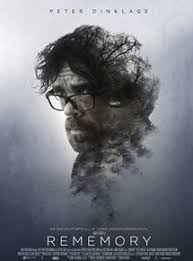![]() 1/2
1/2
USA 2017
Opening November 8, 2018
Directed by: Mark Palansky
Writing credits: Mike Vukadinovich, Mark Palansky
Principal actors: Peter Dinklage, Martin Donovan, Julia Ormond, Evelyne Brochu, Anton Yelchin, Matt Ellis
 Is this science-fiction, a whodunit, or a sentimental human drama? While it has a decided sci-fi element – its central object is a machine that reads and plays back one’s memories in POV-video clarity – it’s paced a bit too slow for most sci-fi fans. There is a mystery which, in the end, is solved to satisfaction. But more than anything else, this is a deeply emotional story on the worst of heartbreaks: grief, regret, guilt and, finally, how to live with them all. Or not.
Is this science-fiction, a whodunit, or a sentimental human drama? While it has a decided sci-fi element – its central object is a machine that reads and plays back one’s memories in POV-video clarity – it’s paced a bit too slow for most sci-fi fans. There is a mystery which, in the end, is solved to satisfaction. But more than anything else, this is a deeply emotional story on the worst of heartbreaks: grief, regret, guilt and, finally, how to live with them all. Or not.
It opens with an expository speech delivered by a psychiatrist (Martin Donovan) before a large audience, the premise being that we do not merely have memories, but that we are memories. He has invented the aforementioned memory machine, and he plays some sample clips for the crowd. A distressed woman runs from the theater, and Sam watches her go. Sam is portrayed by Peter Dinklage at his tortured, brooding best, and it is primarily his intense performance that elevates this film.
When the psychiatrist-inventor turns up dead by unknown causes, Sam turns detective. It’s already evident that he is seeking more than just a killer. Sam has some demons of his own – he was driving the night his beloved brother was killed – but there’s more to it than that. Few actors do spiritual anguish like Dinklage, unless it’s Anton Yelchin, seen here in one of his final roles before his own sad death. His portrayal of a man agonized by horrific memories dredged up by the memory machine is itself worthy and memorable.
Sam seeks out the psychiatrist’s widow (Julia Ormond, in another lovely performance) and absconds with the memory machine. To what end? Sam tells us nothing, and we learn his story along the way, just as we discover with him the truth he has sought. There are some good, though not great, twists, made slightly obnoxious by the musical score, which turns electronic and video-gamish at suspenseful moments. And if you focus too hard on the logic of the machine – why and how does a recorded memory switch from first to third person? – it falls apart. But as a human tragedy, and with the emphasis on the human performances, it succeeds. 111 minutes (Mason Jane M.)
